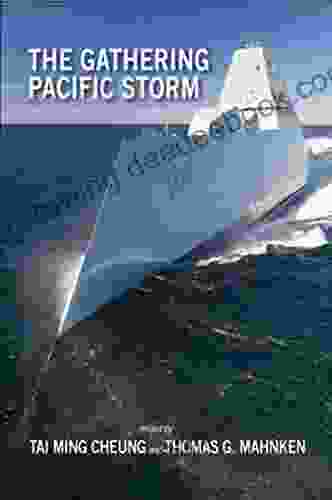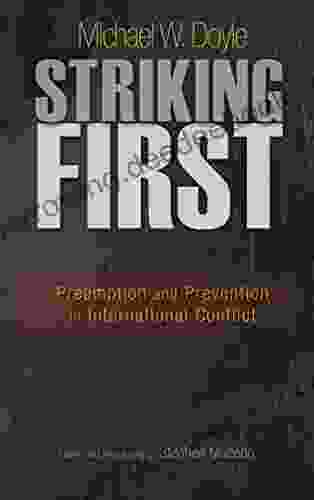Preemption and Prevention in International Conflict: A Comparative Analysis of the United States and the United Kingdom

Preemption and prevention are two key concepts in the study of international conflict. Preemption refers to the use of military force to prevent an imminent attack by an adversary. Prevention, on the other hand, refers to the use of military force to prevent an adversary from acquiring the capability to attack in the future.
Both preemption and prevention are controversial concepts, and there is no easy answer to the question of when, if ever, they are justified. However, it is important to understand the different factors that shape the use of preemptive and preventive military action, and to assess the potential risks and benefits of such action.
In this article, we will compare the approaches of the United States and the United Kingdom to preemption and prevention. We will provide a historical overview of the two countries' use of preemptive and preventive military action, and analyze the factors that have shaped their respective approaches. We will also examine the legal and ethical implications of preemptive and preventive military action, and explore the challenges and opportunities for cooperation between the United States and the United Kingdom in this area.
5 out of 5
| Language | : | English |
| File size | : | 1213 KB |
| Text-to-Speech | : | Enabled |
| Screen Reader | : | Supported |
| Enhanced typesetting | : | Enabled |
| Word Wise | : | Enabled |
| Print length | : | 201 pages |
The United States and the United Kingdom have a long history of using preemptive and preventive military action. The United States, for example, has used preemptive force in a number of cases, including the 1898 Spanish-American War, the 1917 entry into World War I, the 1941 attack on Pearl Harbor, and the 2003 invasion of Iraq. The United Kingdom has also used preemptive force on a number of occasions, including the 1899 Boer War, the 1914 entry into World War I, the 1939 entry into World War II, and the 1982 Falklands War.
In recent years, the United States and the United Kingdom have both adopted a more expansive view of preemption and prevention. The United States, for example, has argued that it has the right to use preemptive force to prevent an adversary from acquiring weapons of mass destruction. The United Kingdom has also argued that it has the right to use preventive force to prevent an adversary from committing a terrorist attack.
The use of preemptive and preventive military action has been controversial in both the United States and the United Kingdom. Critics argue that such action is illegal, unethical, and counterproductive. Supporters argue that such action is necessary to protect national security and prevent future attacks.
There are a number of factors that have shaped the use of preemptive and preventive military action by the United States and the United Kingdom. These factors include:
- National security concerns: The primary factor shaping the use of preemptive and preventive military action is the desire to protect national security. Both the United States and the United Kingdom have used preemptive and preventive force to protect their own citizens from attack, and to prevent the spread of weapons of mass destruction and terrorism.
- Historical experience: The historical experience of the United States and the United Kingdom has also shaped their respective approaches to preemption and prevention. The United States, for example, has a history of using preemptive force to prevent attacks by Native Americans and other indigenous peoples. The United Kingdom, on the other hand, has a history of using preventive force to maintain its colonial empire.
- Political culture: The political culture of the United States and the United Kingdom also influences their respective approaches to preemption and prevention. The United States has a more individualistic political culture, which values personal freedom and autonomy. The United Kingdom, on the other hand, has a more collectivist political culture, which values social order and security.
- Legal and ethical considerations: Legal and ethical considerations also play a role in shaping the use of preemptive and preventive military action. Both the United States and the United Kingdom have legal and ethical obligations to refrain from using force unless it is necessary to protect their citizens from imminent attack.
The use of preemptive and preventive military action raises a number of legal and ethical issues. One of the most important legal issues is the question of whether such action is justified under international law. The United Nations Charter prohibits the use of force except in self-defense or with the authorization of the Security Council. However, some states, including the United States and the United Kingdom, argue that they have the right to use preemptive or preventive force to protect their national security.
Another important legal issue is the question of whether preemptive and preventive military action is effective. There is no clear evidence that such action is an effective way to prevent attacks or to achieve other desired outcomes. In fact, some studies have shown that preemptive and preventive military action can actually increase the risk of conflict.
Finally, there are a number of ethical issues that arise from the use of preemptive and preventive military action. One of the most important ethical issues is the question of whether such action is morally justified. Some people argue that preemptive and preventive military action is morally wrong because it involves the intentional killing of innocent people. Others argue that such action is morally justified if it is necessary to prevent a greater evil, such as a terrorist attack.
The United States and the United Kingdom face a number of challenges and opportunities in cooperating on preemption and prevention. One of the biggest challenges is the fact that the two countries have different approaches to such action. The United States is more likely to use preemptive force, while the United Kingdom is more likely to use preventive force. This difference in approach can lead to disagreements and misunderstandings between the two countries.
Another challenge is the fact that the use of preemptive and preventive military action is often controversial. Both the United States and the United Kingdom have been criticized for using such action in ways that are illegal, unethical, or counterproductive. This controversy can make it difficult for the two countries to cooperate on preemption and prevention.
Despite these challenges, there are also a number of opportunities for cooperation between the United States and the United Kingdom on preemption and prevention. One of the most important areas of cooperation is the development of common principles and guidelines for the use of such action. The two countries could also cooperate on the sharing of intelligence and the development of new technologies to
5 out of 5
| Language | : | English |
| File size | : | 1213 KB |
| Text-to-Speech | : | Enabled |
| Screen Reader | : | Supported |
| Enhanced typesetting | : | Enabled |
| Word Wise | : | Enabled |
| Print length | : | 201 pages |
Do you want to contribute by writing guest posts on this blog?
Please contact us and send us a resume of previous articles that you have written.
 Book
Book Novel
Novel Page
Page Chapter
Chapter Genre
Genre Paperback
Paperback Newspaper
Newspaper Sentence
Sentence Bookmark
Bookmark Shelf
Shelf Glossary
Glossary Bibliography
Bibliography Foreword
Foreword Preface
Preface Synopsis
Synopsis Manuscript
Manuscript Scroll
Scroll Classics
Classics Library card
Library card Narrative
Narrative Reference
Reference Encyclopedia
Encyclopedia Dictionary
Dictionary Narrator
Narrator Librarian
Librarian Catalog
Catalog Card Catalog
Card Catalog Stacks
Stacks Periodicals
Periodicals Research
Research Scholarly
Scholarly Reserve
Reserve Reading Room
Reading Room Rare Books
Rare Books Special Collections
Special Collections Thesis
Thesis Dissertation
Dissertation Storytelling
Storytelling Theory
Theory Textbooks
Textbooks Matt Gaetz
Matt Gaetz Dawna Markova
Dawna Markova John Dunlavey
John Dunlavey Joanne Webb
Joanne Webb Ethem Alpaydin
Ethem Alpaydin Diane N Quintana
Diane N Quintana William H Janeway
William H Janeway Sue Mcdonagh
Sue Mcdonagh Katia Luz
Katia Luz Stephanie Hammond
Stephanie Hammond Carey Perloff
Carey Perloff Tania Romanov
Tania Romanov April Parker
April Parker Amy Joy Bsw Mpa
Amy Joy Bsw Mpa Roberto Sampaolesi
Roberto Sampaolesi Carol Topp
Carol Topp Ronaldo Collo Go
Ronaldo Collo Go Nora Sakavic
Nora Sakavic David Dicaire
David Dicaire Daniele Vella
Daniele Vella
Light bulbAdvertise smarter! Our strategic ad space ensures maximum exposure. Reserve your spot today!

 Billy FosterAn Irish Country Novel: A Captivating Journey into the Heart of Rural Ireland
Billy FosterAn Irish Country Novel: A Captivating Journey into the Heart of Rural Ireland
 John Dos Passos11 Non-Verbal Reasoning Quick Practice Tests Age 10-11 for the GL Assessment
John Dos Passos11 Non-Verbal Reasoning Quick Practice Tests Age 10-11 for the GL Assessment
 Marvin HayesHuman Behavior and Public Policy: The Role of Political Psychology in Shaping...
Marvin HayesHuman Behavior and Public Policy: The Role of Political Psychology in Shaping... Jermaine PowellFollow ·19.5k
Jermaine PowellFollow ·19.5k John MiltonFollow ·18.7k
John MiltonFollow ·18.7k Francisco CoxFollow ·15k
Francisco CoxFollow ·15k Ron BlairFollow ·10.3k
Ron BlairFollow ·10.3k Terry BellFollow ·3.7k
Terry BellFollow ·3.7k Jeffrey HayesFollow ·13.9k
Jeffrey HayesFollow ·13.9k Douglas FosterFollow ·12.3k
Douglas FosterFollow ·12.3k Charlie ScottFollow ·14k
Charlie ScottFollow ·14k

 Darius Cox
Darius CoxThe Gathering Pacific Storm: An Epic Struggle Between...
The Gathering...

 Hugo Cox
Hugo CoxHow CIA-Contra Gangs and NGOs Manufacture, Mislabel, and...
In the annals of covert operations, the CIA's...

 Finn Cox
Finn CoxDr. Brandt's Billionaires Club Series: The Ultimate...
A Journey into the Pinnacle of...

 Isaac Asimov
Isaac AsimovCurrent Affairs Daily Digest 20180730 30th July 2024
National ...

 Felix Carter
Felix CarterBroadway Celebrates The Big Apple Over 100 Years Of Show...
Broadway Celebrates the Big Apple: Over 100...

 Beau Carter
Beau CarterThe Big Book of Flute Solos: A Comprehensive Collection...
If you're a flute player,...
5 out of 5
| Language | : | English |
| File size | : | 1213 KB |
| Text-to-Speech | : | Enabled |
| Screen Reader | : | Supported |
| Enhanced typesetting | : | Enabled |
| Word Wise | : | Enabled |
| Print length | : | 201 pages |






